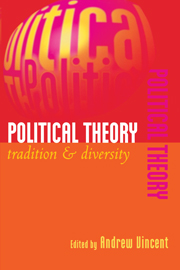Book contents
- Frontmatter
- Contents
- Preface
- List of Contributors
- Introduction
- 1 Political Theory and Conceptual Change
- 2 Political Theory and the Problem of Anachronism
- 3 Utilitarianism as a Public Philosophy
- 4 Rational Choice Political Theory
- 5 Republican Political Theory
- 6 Liberalism, Multiculturalism and Oppression
- 7 Postcolonialism and Political Theory
- 8 Legal Positivism and Political Power
- 9 Political Theory, International Theory, and the Political Theory of International Relations
- 10 Method Matters: Feminism, Interpretation and Politics
- 11 The Political Philosophy of Deleuze and Guattari
- 12 The Object of Political Theory
- Index
10 - Method Matters: Feminism, Interpretation and Politics
Published online by Cambridge University Press: 29 March 2011
- Frontmatter
- Contents
- Preface
- List of Contributors
- Introduction
- 1 Political Theory and Conceptual Change
- 2 Political Theory and the Problem of Anachronism
- 3 Utilitarianism as a Public Philosophy
- 4 Rational Choice Political Theory
- 5 Republican Political Theory
- 6 Liberalism, Multiculturalism and Oppression
- 7 Postcolonialism and Political Theory
- 8 Legal Positivism and Political Power
- 9 Political Theory, International Theory, and the Political Theory of International Relations
- 10 Method Matters: Feminism, Interpretation and Politics
- 11 The Political Philosophy of Deleuze and Guattari
- 12 The Object of Political Theory
- Index
Summary
I want to consider a particularly interesting and significant strand of feminist political theory. It consists of two threads, and each thread consists of separable fibres. The first thread is the commitment to interdisciplinarity. This embodies the eclecticism necessary to achieve a rounded view of an object like gender, which can be studied from the perspective of psychology, literature, biology, political science. This should perhaps be labelled ‘multidisciplinarity’. ‘Interdisciplinarity’ prompts us to look at competing constructions of an object or phenomenon. Disciplinary perspectives might subtract from each other as much as add. This perception of the tensions between disciplines possibly has much to do with feminist women's uneasy relationship with the academies. It is difficult to believe, as many academics and scientists have believed, that any one discipline can offer an adequate account of its objects. For the purposes of this chapter, there is reason to be sceptical about the pretensions of political studies (or political science) in two areas: picking out objects of analysis (politics, political institutions, political relationships) which are uniquely its own; and explaining those objects itself, entirely from its own resources.
The second thread is the centrality of interpretive method. ‘Interpretivism’ encompasses the interpretation both of texts proper (films, books, the life's work of an author or group), and of text analogues (social events and social practices). It can refer to conceptual analysis, theory formation, or the construction of social reality as interpretation.
- Type
- Chapter
- Information
- Political TheoryTradition and Diversity, pp. 214 - 236Publisher: Cambridge University PressPrint publication year: 1997



